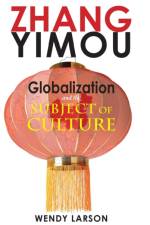von Wendy Larson
144,00 €
Zhang Yimou is one of the most famous filmmakers of China, as well as one of the most controversial. Long the object of intense discussion and critique in China, Zhang s approach can express a highly stylized and crafted aesthetics, a documentary, daily-life feel, or a historically rich sense of tragedy and sometimes comedy. The director of some twenty feature films, Zhang also is known for other projects, including work as a cinematographer and actor, and directing the opening ceremonies of the 2008 Beijing Olympics. As a prominent member of the pioneering Fifth Generation of film directors that began working after the Maoist period, Zhang s unique aesthetics garnered global attention. Several of Zhang Yimou s films have won domestic and international awards. Red Sorghum (1987) won the Golden Bear Award, Qiuju Goes to Court (1992) and Not One Less (1999) won the Golden Lion, To Live (1994) won the Grand Prix du Jury, and The Road Home (1999) won the Jury Grand Prix. To Live was banned in China, and Zhang as well as lead actress Gong Li was prevented from making films for two years. The debate that has centered on Zhang s films began right after Red Sorghum came out, and has continued to the present day. Critics branded his work as a self-Orientalizing fantasy that used the trope of a beautiful, vulnerable woman to suggest an inferior position for Chinese culture vis-a-vis the film s Western viewers. In some films notably Red Sorghum and Hero (2002), critics found an endorsement of authoritarian politics. These post-colonial and feminist critiques were countered by those who argued that the films broke through socialist isolation, for the first time finding for Chinese film a global audience. Others argued that the films were more subtle than critics recognized: embedded within them were complex inquiries into power, display, and authority. Despite his stature among Chinese film directors, Zhang Yimou has not yet been the subject of a book-length treatment in English. Film professors who teach his films only have access to a relatively small corpus of articles and book chapters published over some twenty-five years. This book is the first attempt to remedy that situation by laying out not simply a biographical or empirical study, but a polemical argument that counters some of the critical trends in the interpretation of Zhang s films. Taking advantage of the great interest in Zhang s work in China and the long-running debate, Zhang Yimou: Globalization and the Subject of Culture uses a wide variety of sources, mainly in Chinese and English, to construct an alternative approach to understanding the films. The study zeroes in on nine feature films and the 2008 Beijing Olympics ceremonies, developing an analysis that both recognizes the formal aesthetic features of the films, while also contextualizing them within the culture debates of contemporary China. Theoretical approaches to the study of film and culture in the West also figure prominently. While finding common themes and structures that bring together several of Zhang s films, the study does not propose a unifying theory of Zhang s work as much as it uncovers connections between the films, showing a sharp, analytical approach at work. In this first critical study of films by Zhang Yimou in English, Wendy Larson plumbs the larger field of debate to suggest thought-provoking ways of thinking about the films and their relationship to Chinese culture. Arguing that the films do not appease Westerners but rather incorporate within themselves an understanding of how culture is changing under globalization, the book interprets the films emphasis on performance under coercion, the duplicity of display, and action under constraint. It investigates themes of gazing and being gazed upon, and behavior under duress, connecting these notions with implications on power, sovereignty, justice, and Chinese modernity. Larson argues that the films do not uncritically promote nationalism as some argue, but rather that they probe the possibilities for and limitations of culture in a globally-situated China. A substantial bibliography that provides references for the overall discussion is included. Zhang Yimou: Globalization and the Subject of Culture is an important book for film scholars and for scholars of Chinese culture and history.

